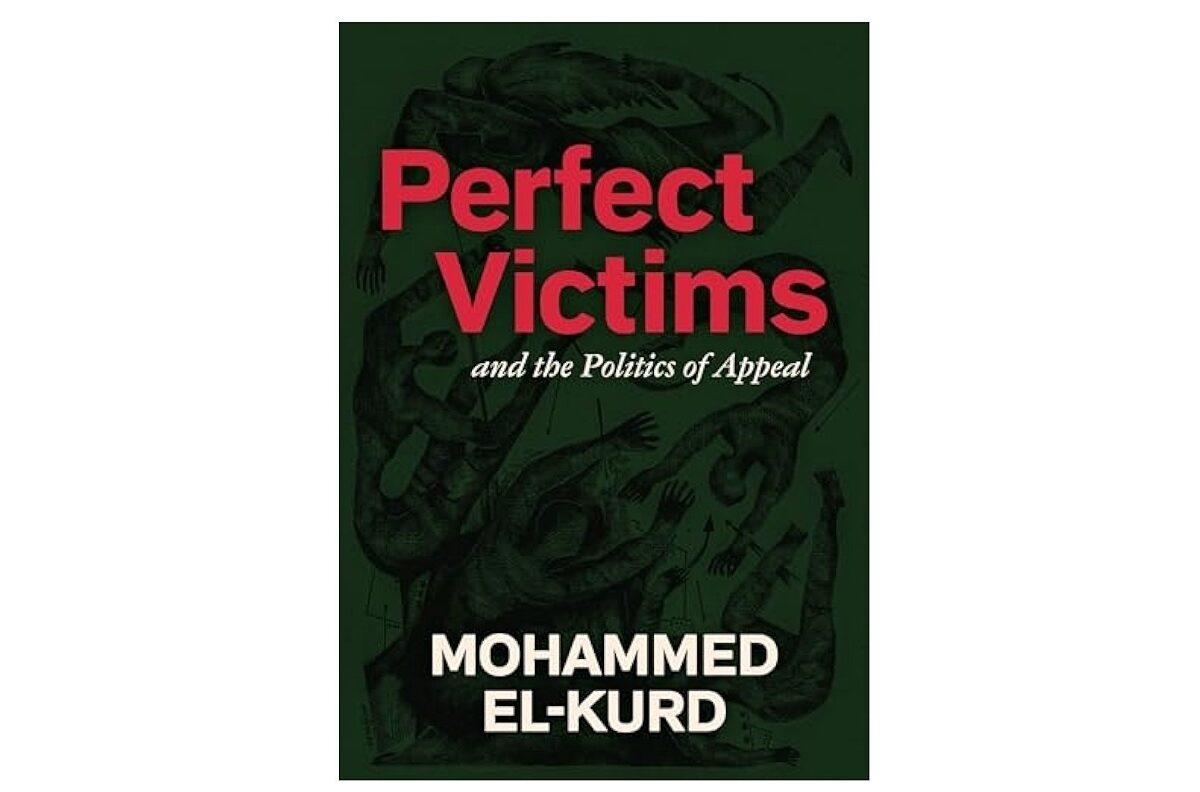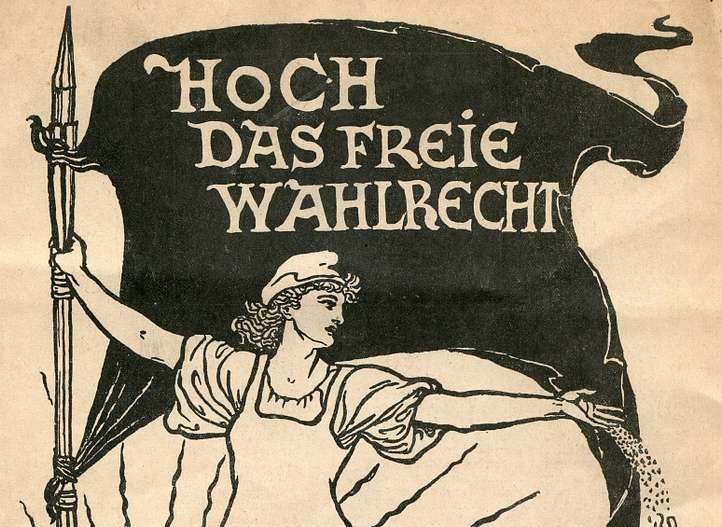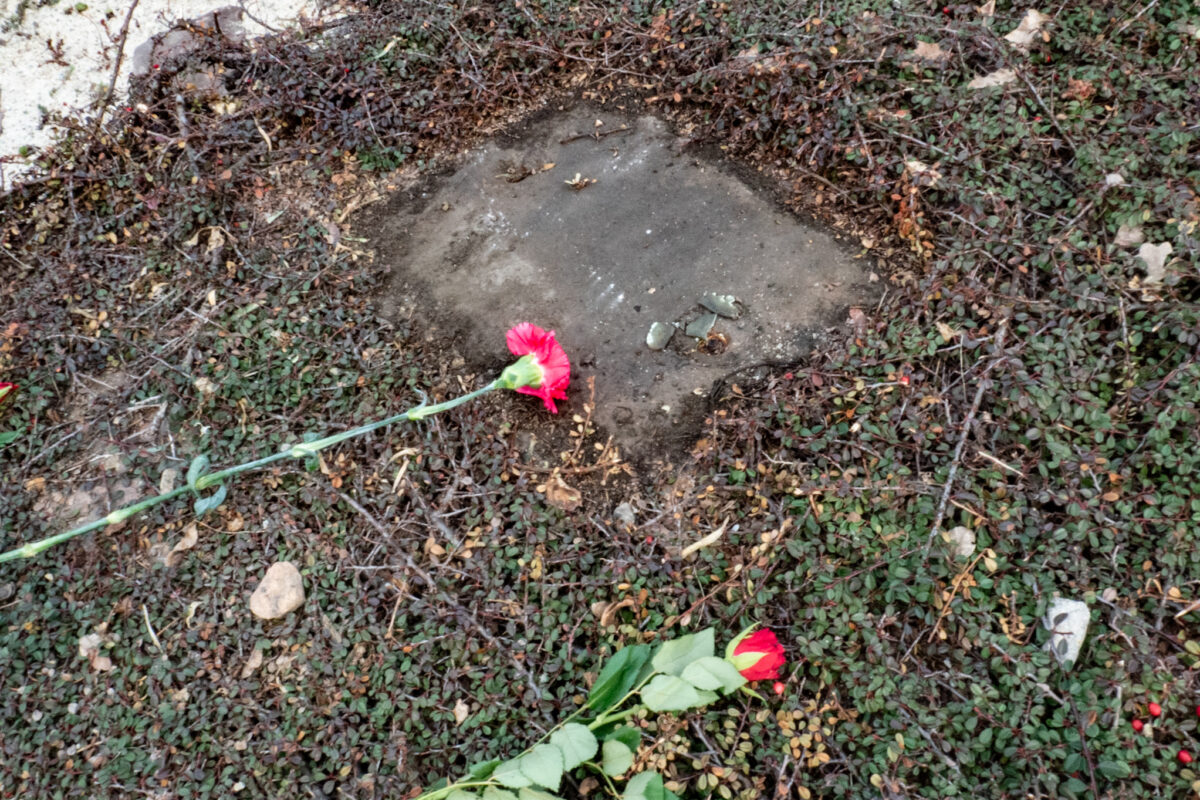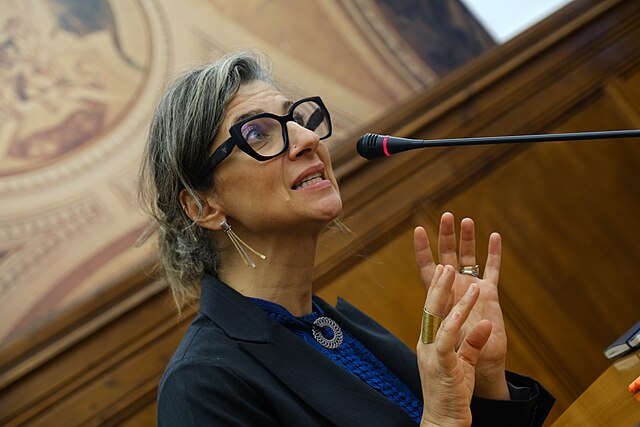February tends to be a pretty harsh time of year in Berlin. Freezing temperatures, short days, and perpetually gray skies weigh heavy upon the city’s inhabitants, amplifying an already fraught atmosphere in Germany. Amidst a persistently bleak economic outlook, the country is undergoing a sharp rightward shift, with traditional parties increasingly mirroring the rhetoric of the far-right AfD, to the point where the distinctions between them are becoming negligible.
This shift has been accompanied by the criminalization and escalating repression of any movement, initiative, or individual criticizing the Israeli government’s actions, or expressing solidarity with the Palestinian people — the victims of what numerous experts describe as an ongoing genocide. The crackdown has only deepened existing tensions: anti-Arab and anti-Muslim sentiment is rampant, while reports of police violence, arbitrary arrests of pro-Palestine demonstrators, dismissals of individuals for publicly supporting Palestine, and defamatory accusations of antisemitism are countless.
Yet, never before has such repression targeted a high-ranking UN official — not until a series of events that featured Francesca Albanese, the UN Special Rapporteur on human rights in the Occupied Palestinian Territories, became the subject of a coordinated campaign to force their cancellation.
The first event — titled Colonialism, Human Rights, and International Law — was scheduled to be held on February 16, at the Ludwig Maximilian University (LMU) in Munich. Just days before, the event was abruptly cancelled by the university, who cited the event’s “political orientation” and vaguely defined “security concerns”. The nature of these supposed risks remains unclear.
On February 19, Albanese was set to speak alongside the director of Forensic Architecture — Israeli-British scholar Eyal Weizman — at another event, titled Calculated Living Conditions to Destroy — Legal and Forensic Perspectives on the Ongoing Genocide in Gaza. This time, the suppression was even more blatant. The standard justifications (such as “polarization” or “security risks”) collapsed, when it emerged that Günter Ziegler (the President of the Freie Universität Berlin) had been directly pressured by Ron Prosor (the Israeli Ambassador to Germany), Kai Wegner (the Mayor of Berlin, CDU), and the group “WerteInitiative. jüdisch-deutsche Positionen” (which claims to work for “a future for Jews in Germany”). The ambassador reportedly wrote directly to Ziegler demanding the event’s cancellation, while Wegner called for its shutdown in Bild — Germany’s most-read newspaper, inexplicably still treated as credible despite its far-right leanings. WerteInitiative, for their part, accused Albanese of “spreading antisemitic worldviews” in a letter to the university. The coordinated effort achieved its goal: the event was canceled.
A third event, organized by the DiEM25 political alliance in collaboration with Jüdische Stimme, Eye4Palestine, and Gaza Komitee Berlin, was scheduled for February 18, at KühlhausBerlin, with the title Reclaiming the Discourse: A Powerful Stand for Palestine, Justice, and Truth. Despite the prior cancellations, the organizers remained confident that the event would proceed as planned. But on the morning of February 18, it became evident this was no longer the case. Under “immense pressure from German politicians and the Berlin police”, the venue withdrew support. Overnight, the main entrance to Kühlhaus was also vandalized with spray-painted messages: Albanese, you are an antisemite, and UNRWA supports terror.
At the eleventh hour, the Berlin-based Marxist newspaper junge Welt stepped in, offering its premises as an alternative venue, though with a drastically reduced capacity. That morning, ticket holders received an email warning that the police had requested access to the gathering — a chilling prospect, given last year’s Palestine Congress in Berlin, which was forcibly shut down by police, leading to multiple arrests. This time, authorities allowed the event to proceed, only under the condition that five police officers be present throughout, ostensibly to “protect freedom of speech” and to ensure that speakers and attendees did not violate the law. The lecture proceeded peacefully without excessive interference.
Amidst this unprecedented crackdown, we spoke with Francesca Albanese about her experience in Germany, the state of fundamental rights in the country, and the current situation in the Occupied Palestinian Territories.
Let’s start with your experience in Germany, and the political and police pressure that you faced. Did you anticipate this level of repression? Have you ever encountered anything similar?
Political pressure is always present, but usually it’s not directed at me personally. Pro-Israel lobby groups are deeply entrenched in the West, operating in similar ways everywhere: they aim to silence or ignore voices like mine. In Italy, for example, I’m simply disregarded. However, civil society ensures that events proceed despite the pressure. In most countries, universities wouldn’t consider canceling an event.
In my three years of speaking about Palestine in around twenty countries, I’ve never encountered anything like in Germany. The real pressure isn’t just on me — it’s on Germans themselves. This is outright censorship and self-censorship. I was shocked by the level of repression at the event I was part of. It wasn’t physical violence against me, and I’m immune to slander, misogyny, and personal attacks. What struck me was the silencing effect on Germans.
For the first time in three years, I felt fear. And I’ve lived with security protection, received death threats, yet I’ve never felt this way. In Germany I sensed something profoundly disturbing — an atmosphere reminiscent of historical accounts of fascism, where people fear speaking out. That’s why I used the expression “lack of oxygen”.
Have you noticed the situation in Germany worsening, since we last met in May?
Yes. Last year I gave multiple interviews, met Foreign Ministry officials, think tanks, and dozens of NGOs. Some criticized me, but many expressed gratitude. This year? Silence. I met only three NGOs. Many wanted to speak behind closed doors, fearful of repression.
I wonder: what changed? Last year I was one of the few calling out the Gaza genocide so forcefully. Now, major organizations — including Amnesty International, Human Rights Watch, Forensic Architecture, and individuals of the caliber of Amos Goldberg — have confirmed what I’ve said. Yet I’m somehow perceived as more controversial than ever. But the difference is not in me, it’s in German society itself, after months of crackdowns: police brutality, arrests, home raids, and a climate of fear that spreads rapidly.
As Michael Barenboim and other participants in the event noted, Germany strongly identifies with Israel, which is understandable given its history. But when that identification blinds one to crimes being committed in the name of an ideology, it means repeating the mistakes of the past rather than learning from them. That, I believe, is the real issue.
As an expert in human rights and international law, how do you assess the current violations of individual freedoms in Germany, such as the freedom of expression and assembly?
The issue goes beyond Palestine, which is just the trigger. Germany has aligned itself so blindly to the idea of protecting Israel at all costs, as a pillar of its state identity, that it struggles to see reality for what it is, and fundamental freedoms are being sacrificed. So how do we reclaim these rights? Not by bowing our heads to fit into a repressive system. If hundreds of thousands have taken to the streets against the far-right, then three times as many should be protesting for their own fundamental rights. Academics should refuse to teach until the freedom of expression and academic freedom are restored. Media outlets that engage in defamation and intimidation should be taken to court. Civil society and NGOs should form a protective barrier against systemic abuses.
But now, in Germany, I don’t see this happening. Where is German civil society? Where are the organizations dedicated to fighting racism? Because that’s what this is — Islamophobia and anti-Arab sentiment are forms of racism. Recognizing this reality, in Germany and beyond, is the only way to reclaim and defend these rights. Awareness must be widespread, and action must follow.
Do you think an effective strategy could be to take legal action, namely turning to courts, the European Court of Human Rights or other organs?
Of course. You can appeal to a judge when your fundamental freedoms have been violated. I’ve raised this issue with several groups in Germany, and they say that in many cases, courts have ruled in favor of repression — I can’t comment on that because I don’t know the German legal system well enough.
What I do know is that I was shocked when — I believe it was from the District Court of Frankfurt — I was labeled an antisemite. That is pure and simple defamation. And yet, no one protested. A UN Special Rapporteur is insulted and slandered by a court, and there are no consequences? I can’t fight battles in every country. It should be up to civil society.
When the banality of evil becomes normalized, it grows unchecked. It can be contained at the national level through civil society and the judiciary. And if that fails, then yes, one must turn to international courts like the European Court of Human Rights. But these are long processes. In the meantime, the erosion of rights continues. That’s why I believe so strongly in mass mobilization.
In Germany, perhaps more than in other countries, one of the tools for restricting personal freedoms is the accusation of antisemitism. While antisemitism — like all forms of racism and discrimination — must be condemned and rejected in the strongest terms, this has become a defamatory and instrumental mechanism to silence dissent against the Israeli and German governments. Those who are targeted by these smears appear powerless and unable to defend themselves. Why do you think this happens?
I think it stems from confusion and guilt. When even those whose profession is critical thinking (such as academics) fail to exercise it, it means there is a trauma. That trauma is likely linked to Holocaust guilt. And I understand it — I feel it too as an Italian.
But it is precisely the guilt over the Holocaust that pushes me to do what I do, alongside fellow human rights activists, intellectuals and academics, many of whom are Jewish. Enough with this performative guilt that Germans display: “we did this, and therefore we cannot…” No — on the contrary, because of this history, you can and must act. And yet, what does Germany do? It doubles down on its support for the Israeli government, even as it commits the most heinous crimes.
After the last German elections, Friedrich Merz, the frontrunner to become the next German chancellor, called the Israeli prime minister Benjamin Netanyahu. He publicly announced that he would seek to circumvent the ICC’s arrest warrant. Before Merz, Donald Tusk — the Polish Prime Minister — declared that Netanyahu would be welcome in Poland for the commemoration of the anniversary of Auschwitz’s liberation. At a time when the very existence of international law seems precarious, what do you think these stances signify?
There is a deeply concerning political dimension here — a blatant disdain for the international legal order. This is dangerous because it reinforces the perception of double standards, of a selective application of international law; of treating it as just another tool for international politics, rather than as the framework, the regulator — almost the thermostat — of international relations.
The political attitude of indifference and contempt toward international law is troubling in itself. This contributes to the erosion of the international criminal justice system, a system that took decades to build. Since the Nuremberg trials, efforts had been made to establish a permanent international court for crimes against humanity. Over the years, we saw international tribunals for (former) Yugoslavia and Rwanda, and hybrid courts, before the International Criminal Court was finally established. It was an incredible step forward. And now, we are witnessing a rollback, a dismantling of this progress.
The alarming speed at which this is happening is compounded by a third factor: a culture of impunity. There is no longer any fear — neither at the international level, nor regionally, nor in bilateral relations between states. A few dominant powers dictate the global order, overriding the reality of a multipolar world. Instead of harmonizing international relations and using law as a guiding compass, we are moving toward a world shaped by American imperialism — an imperialism that no longer hides its willingness to use military force whenever it sees fit. This is an extremely dangerous scenario — one of lawlessness. And we should all be deeply concerned.
Your latest report, Genocide as Colonial Erasure, has proven to be eerily prophetic. The violence in Gaza has never truly ceased, and it has expanded into the West Bank. A few days ago, the IDF entered the Jenin refugee camp with tanks, for the first time in twenty years. What is your current assessment of the situation?
The situation in the Occupied Palestinian Territories is deeply alarming. The so-called ceasefire created the illusion that the emergency had passed. But humanitarian aid is not reaching people. Tents are not being delivered. Israel continues to fire at civilians in Gaza — over 100 people have been killed since the supposed ceasefire began. Meanwhile, Israel has made it clear that it will not withdraw from the Philadelphi Corridor, signalling its intention to fully entrap Gaza.
Israel must come to terms with the fact that it cannot continue to suppress the Palestinians — it must allow them to live, to be free. This is the lesson it should have learnt over the past 15-16 months, yet it refuses to acknowledge it.
At the same time, the situation in the West Bank is not fundamentally different from what is happening to the Palestinian people as a whole. In Gaza, the attack has been genocidal in its intensity, but the same logic of destruction is being applied in the West Bank — though in a way that garners less attention, with fewer visible explosions. Palestinian communities are being forcibly displaced, their homes demolished, their hospitals destroyed, their farmlands burned.
What worries me most is whether the world will recognize this genocide for what it is — the ability to see Israel’s violence as a systematic attack on the Palestinian people as a whole, across the entire occupied territory. Because that is exactly what it is.
In light of the escalation of violence and the situation you’ve described, Europe continues to appear divided and inadequate in its response to the ongoing emergency in Palestine. Have you noticed any evolution in Europe’s position (or that of the international community) that seems absent to us?
I don’t think it’s absent. I’d say there are three groups: those who act and take measures, like the members of the Hague Group or South Africa, and the other states that have filed a case at the International Court of Justice. They have taken action, especially the Hague Group. There are also some South American states that have suspended trade or military agreements with Israel — these are important steps. There are national-level divestment initiatives from companies operating in occupied territories. These actions matter, but they are still too isolated and not widespread enough.
Then, there is a minority of states — but they are very aggressive — led by the United States and Israel, followed by others. Sometimes it’s hard to tell where Israeli policy ends and U.S. policy begins. This core group is acting in flagrant violation of international law, and they don’t seem to care.
And then there’s the vast majority of states that vote against the occupation but still continue doing business with Israel, failing to take a firm stance. There are many such states.
I believe the situation won’t shift positively — meaning for the freedom and rights of all people — unless there is a massive mobilization. This is a systemic struggle, but unfortunately, people don’t see it. I keep saying it: we are at the potential tipping point of a necessary revolution. Right now, capitalism has armed itself — with technology, communication channels, cloud control, artificial intelligence, and weapons. Either we resist now, or it will be too late. Resisting in defense of rights is a necessary action at this moment.
The Israeli government is effectively dismantling UNRWA, an agency that emanates directly from the UN Security Council. Are there any sanctioning mechanisms or consequences for a UN member state’s actions against the UN itself?
No. Israel has been waging a legal and reputational war against the agency for 20 years. This campaign has intensified in recent years, with constant attacks accusing the agency of recruiting terrorists. Investigations have found no evidence to support claims that UNRWA staff were complicit in acts of violence against Israelis. Yet, even without proof, UNRWA dismissed those employees, going against its own rules.
Frankly, UNRWA has also contributed to its own downfall. As I’ve often said, UNRWA is its own worst defender. Israel has exerted pressure through all its supportive forces, including pro-Israel lobby groups operating in various Western countries. These groups have pushed for funding cuts to UNRWA, but the fiercest battle has been fought through Israeli legislation. This has been the most aggressive attack. In response, I don’t think there has been nearly enough effort to defend UNRWA. The agency should have received stronger support both internally and externally. The office in Jerusalem should never have been abandoned. UNRWA leadership ordered the evacuation, but I would have rather reinforced the presence of international staff. Instead, there seems to have been a retreat — perhaps out of exhaustion. But that’s not fair, because Palestinians are exhausted too.
In recent days, the American organization DAWN has asked the ICC to investigate the former U.S. President Joe Biden, the former Secretary of State Antony Blinken, and the former Secretary of Defense Lloyd Austin for “aiding, abetting, and intentionally contributing to war crimes in Gaza”. How significant do you think this development is? Do you believe it’s realistic to expect an actual investigation?
I hope there will be one. The problem is that the Court is under enormous pressure — it has even been sanctioned by the United States. So I hope that this investigation is supported and receives all the necessary materials, but it won’t be easy to proceed.
I certainly think there are grounds to investigate U.S. political leaders, particularly the Biden administration, which has provided military, political, economic, and financial support to this genocide. They knew exactly what Israel was doing, and they supported it anyway.
So justice would absolutely be desirable. But the problem is, we don’t live in a just world. We don’t live in an equitable world. A just and equitable world must be built, and it takes the strength and awareness of everyone to do it.




